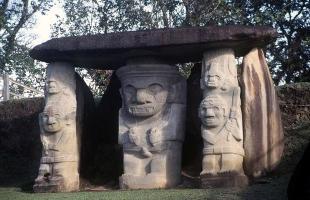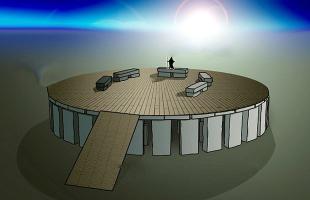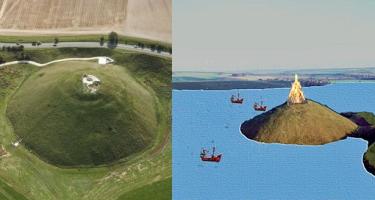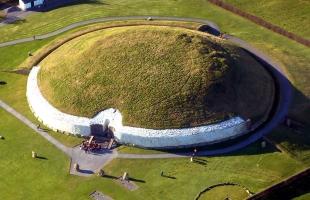Copy Link
Add to Bookmark
Report
Short Talk Bulletin Vol 13 No 02

SHORT TALK BULLETIN - Vol.XIII February, 1935 No.2
LEWIS AND LOUVETEAU
by: Unknown
Old English Tracing Boards of the entered Apprentice degree show the
Lewis, a peculiar tool of operative masons.
The instrument is made of a pair of dovetail wedges, provided with a
hook or ring. Inserted in a hole in a large stone, pulling on the
hook or ring spreads and locks the wedges securely in the stone, so
that it may be raised by derrick or other lifting force, without
putting a rope or chain about it. The greater the pull, the heavier
the stone, the more securely is the Lewis locked in the hole.
From this the Lewis easily became a symbol of strength, and is so
denominated in certain old English rituals.
In the transactions of Quatuor Coronoti Lodge, the great research
organization of London, in Volume X (1897) appears the following:
In a Charter of Ethelbert, dated 862, Lewisham is known a Liofshema
mearc, the mark of the inhabitants of Liofsham, the home or
dwelling of some person whose name began with the element Liof or
Leof, i.e., dear. This prefix appears to be corrupted from Keof-
su, which was from Leofsuna, literally, dear son. It still survives
in the family named Leveson, pronounced Lewson. The place name
appears to go through some digressions, for the seventeenth century
it was written Lewsam, and was spelt phonetically as Lusam, end
eventually it became, through change of etymology, Lewis. In Masonic
language, we have also another lewis to account for, namely the
combination of pieces of metal, which form a dovetail; now if the
urchin who assisted his father was called Lewis, it is possible that
the comparatively small piece of mechanism, in comparison to the
weight it is capable of sustaining, as a saving of labor, may have in
trade vocabulary been called a lewis - dear one.
The Harris Masonic manuscript, No.1 (seventeenth century) defines the
word as follows:
A Lewis is such an one as hath served an Apprenticeship to a Mason,
but it is not admitted afterwards according to the custom of making
Masons.:
Compare this with the curious statement in the Carmick manuscript, in
the possession of the Grand Lodge of Pennsylvania:
You shall not make a Mould or Square for any that is cut a Kenis,
for a Kenis is one that hath not admitted afterwards according to the
Custom of Making Masons.
Hughan, the great Masonic scholar, read Cut a Kenis to mean But a
Lewis - in other words, the prohibition to Masons is that no Mould
or Square may be made for any one who is only a Lewis, not actually
a member of the Craft.
The son of an English Mason is called a Lewis, for a reason which is
set forth in Brownes Master Key, which purports to be a verbatim
account of a part of the original Prestonian lecture. It reads:
What do we call the son of a Freemason?
A Lewis.
What does it denote?
Strength.
How is a Lewis depicted in Masons Lodge?
As cramp (clamp) of metal, by which, when fixed into a stone, great
and ponderous weights are raised to a certain height, and fixed upon
their p[roper basis, without which Operative Masons could not so
conveniently do.
What is the duty of a Lewis, the Son of a Mason, to his aged parents?
To bear the heavy burden in the heat of the day and help them in time
of need, which, by reason of their great age, they ought to be
exempted from, so as to render the close of their days happy and
comfortable.
His privilege for so doing?
To be made a Mason before any other person, however dignified by
birth, rank or riches, unless he, through complaisance, waives this
privilege,
In France the son of a Freemason is called a Louveteau (daughter
Louvetine) which may have been derived from louffton a word
occasionally used in place of Lewis in the seventeenth century; the
French word for the operative instrument is Louve. Here a curious
verbal bypath invites the student; Louveteau also means a young wolf.
In the Egyptian Mysteries, the candidate, wearing a mask or covering
simulating a wolfs head, was often called wolf. Apparently the
reason for the masking of a candidate as a wolf is found in the
tenuous connection between the sun, which scatters the flocks of
stars from the sky, and the wolf, which scatters the flocks of sheep
and cattle. The sun was the central symbol of many ancient mystery
religions. Similarly, the Greek Lukos is both the sun and a wolf.
Albert Pike said that a Louveteau might be received as such when
twelve years of age, or over. According to this authority, any
Symbolic Lodge might receive any Louteteau by a special ceremony,
which while it did not especially obligate the Lodge to support or
educate him, did promise that the Lodge would watch over him, protect
him, give him counsel and advice. In his book, Offices of Masonic
Baptism, Reception of a Louveteau and adoption, Pike states:
It (the ceremony of reception) entitles the Louveteau to be received
an Apprentice at the age of twenty-one years, if he be found worthy
and intelli-gent.
The qualifying phrase obviously takes away from the privilege the
first promises, since all men who are worthy and intelligent may be
received an Apprentice at the age of twenty-one years.
Pike lays down rules regarding the reception of a Louveteau; the
question may be considered at a regular meeting of the Lodge;
application must be made in writing by the father, if living;
otherwise, in writing by the mother, or other relative or friend; the
father must be a member of a Lodge, except that, by unanimous vote, a
Louveteau may be received even if the father is not a member - the
son may be worthy, though the father may constitute the strongest
claim of the child on the Lodge; action may be had without a
Committee, in the absence of objection; if a brother desires, a
Committee of three will be appointed, to report at the next regular
meeting; ordinarily, a two-thirds vote is sufficient to insure
reception; applications refused may be re-presented in six months;
bad character of applicant or unworthiness of the father is good
cause for rejection, otherwise, to become a Louveteau is a matter
of right; vote is in an Entered Apprentices Lodge and the result
with the names of those voting yea and nay is to be entered on the
records.
Pikes reception of a Louveteau covers sixty pages. A single
quotation will suffice:
It is one of the duties of Brotherhood, arising out of that holy
relationship, to guide and guard, and rear and educate, if need be, a
Brothers children. Let us recognize this duty, and add to its
obligation our solemn pledge to watch incessantly over this youth, to
avert from him pestilential influences, warn him against ill
examples, and rescue him from perils. Let us, according to our
ancient custom, and by the ancient and symbolic name, receive him as
our Ward in the hope that he will in due time become our Brother.
Where Pike got the authority for the statements he makes or the
inspiration for his beautiful if lengthy ceremony, cannot be stated.
No American Grand Lodge authorizes such a ceremony. But Pikes
statement that it is one of the duties of Brotherhood to guide and
guard, to rear and educate a brothers children is followed in both
letter and spirit by many Grand Lodges; which maintain Homes, Schools
or Charity Foundations by which the children of Master Masons are
guide, guarded and educated when the father has passed beyond his
power to do a fathers duty. Spiritually, then, if not by Masonic
law, the children of a Master Mason are indeed treated as Pike would
have had Louveteaus and Louvetines treated.
Erroneous statements are often made that a Lewis may be initiated at
eighteen years of age. Washington, who received his Entered
Apprentice degree when he was twenty years and eight months of age;
is often mentioned to prove the point.
Whatever the practices in an older day, in England a Lewis cannot now
be initiated before he is of lawful age, without a dispensation.
There is no evidence whatever that Washington was ever considered a
Lewis. His initiation before being twenty-one can much more
logically by laid to the lax practices of an easy age when
Freemasonry in this country was very informal, far from original
authority, developing largely from its own motion in a time when
experiment in a new land, with a new government, in ideas, in hopes
was in the air.
In middle ages England it was an invariable custom for a son to
follow in his fathers footsteps; such names as Smithson, Wrightson,
etc., come from the days when the smith and the wheelwright had sons
who became also wheelwrights and smiths. Most fathers have a hope
that their sons will follow where they led, take up the same
profession, carry on the old firm; it is human expression of the
longing for that form of immortality, expressed in the desire that
what has been honorable and useful in the family will continue to be
so.
Masons who have sons are usually intensely interested in seeing them
become members of the ancient Craft. A Petition and fee is often
made a coming-of-age gift to a young man on his twenty-first
birthday. From this natural hope of a Mason that his son will go
where he preceded him, in turn to receive Masonic light and the
happiness and education that may come from membership in a Lodge, has
arisen the feeling in most Lodges, the stronger that it is not
expressed in formal law, of interest in the boys of members. Lodges
are not consciously influenced in their judgment of petitions from
the sons of members by that fact, but Masons would be less than human
if they did opt look with some indulgence on the young men who ask to
follow in the path their fathers have walked.
In this sense, then, the Lewis has a privilege in all Lodges; he is
already known, by proxy at least, to the Lodge to which he applies,
and there is a natural predisposition favorably to consider his
application, and for the committee to judge him with mercy.
It is a sound tribute to the common sense of American Masonic law
that the Lewis has few if any legally stated privilege. The Grand
Lodge of North Dakota has in its by-laws (page 38, revision of 1928):
Candidate: Age reduced in some Cases - Lewis.
Any Lodge in this Grand Jurisdiction may lawfully receive and ballot
upon a petition for the degrees of a son or nephew of an affiliated
Mason within the last six months of such petitioners twenty-first
year; however, if elected, he shall not be initiated an Entered
Apprentice until he has attained the age of twenty-one.
The Constitution of the Grand Lodge of the District of Columbia prior
to 1924 stated:
No Lodge shall initiate any candidate who is under 21 years of age,
etc.
Questions arising as to the age at which application might be
received, Grand Master Roberts ruled (1924) that no petition might be
legally received from a minor, basing his ruling on civil law which
makes minors unable to execute contracts. Later, the Constitution
was revised to read:
No Lodge shall accept the petition of any candidate who is under 21
years of age at the time of the presentation of his petition to the
Lodge, etc.
Generally speaking, Grand Lodges require petitioners to be of legal
age; all in this country require them to be either twenty-one or of
lawful age before initiation.
During the Great War, many Grand Jurisdictions waived not only
suitable proficiency between degrees, but often the matter of
lawful age for sons of Masons in the armed forces of the nation.
Lodges with a restricted membership often provided that the petitions
of sons or fathers of members may be received and ballot had,
regardless of whether the roster is full or not.
The Order of DeMolay for boys is for sons of Master Masons, and their
friends; which in effect means any boy who can be recommended by a
Master Mason. The Order continually insists that its membership is
not in any way to be considered as helpful in later receiving Masonic
membership.
Lewis and Louveteau, sons of Masons, in this country, then, are words
with no special Masonic standing; the words are scarcely known to a
majority of Masons. But in the spirit of our Lodges the old idea of
the son following in his fathers footsteps persists; hence it is not
infrequent to find Lodges arranging father and son nights, and it
is still an event in any Lodge when a father raises his son to the
Sublime Degree - more rare, and even more interesting, when it is the
sons good fortune to raise his father.
Predicating the whole philosophy of Freemasonry upon a certain
Fatherhood, it would be odd indeed, however little official
recognition we give them, if Masons had no special tenderness of
feeling for their Lewises and Louveteas.























